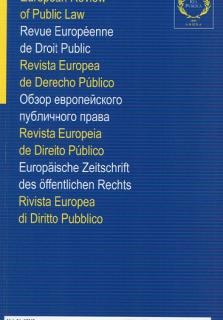
Α CRITICAL OUTLOOK IN THE EUROPEAN UNION:
THE ISSUE OF IMMIGRATION IN GREECE
CHRISTINA M. AKRIVOPOULOU
PhD Constitutional Law. Special Scientist, Democritus University of Thrace,
Hellenic Open University, Greece.
Post-doctoral Researcher, Greek State Scholarship Foundation
This paper analyzes the main characteristics of the Greek immigration crisis and the policies adopted to resolve it since its emergence in the early 90's, in the perspective of the relevant European Union framework. The main argument of the present account is that though the role of Greece geographically and politically is crucial for the unraveling of the EU's immigration problems, nevertheless it has been underestimated both on the national and the EU level. The EU until recently has chosen to deal with it as an exclusively Greek problem, whilst the Greek state has failed in predicting its true dimensions. According to this opinion, the recent economic crisis forces for the adoption of a new set of policies regarding especially the illegal immigration in Greece on behalf of both the EU and the Greek state. The present paper is thus divided into two parts. The first is analyzing the immigration crisis in Greece, the national legal framework and the current dimension of the problem along with the problems generated by the relevant EU frame¬work and especially the EU asylum policy (Dublin II Regulation). The second part introduces the main characteristics and the evolution of the EU immigration policy aiming to present the fallacies in adopting specific solutions to the immigration problems originated in the European South, namely Greece. In the end, instead of conclusive remarks, some proposals concerning the introduction of a new EU immigration policy for Greece are presented.
Cet article analyse les principales caractéristiques de la crise de l'immigration en Grèce et les politiques adoptées pour la résoudre depuis son émergence au début des années quatre-vingt-dix, sous l'angle du cadre communautaire pertinent. L'idée essentielle de ce compte-rendu est que, bien que le rôle de la Grèce, sur le plan géographique et politique, soit crucial pour venir à bout du problème de l'immigration de l'Union européenne, ce problème a été sous-estimé au niveau tant national que communautaire. Jusqu'à récemment, l'Union européenne a choisi de considérer que c'était un problème exclusivement grec, et l'Etat grec, de son côté, a échoué à prévoir ses véritables dimensions. Selon cette opinion, la récente crise économique oblige aussi bien l'UE que l'Etat grec à adopter un ensemble nouveau de politiques concernant notamment l'immigration clandestine en Grèce. L'article est donc divisé en deux parties. La première analyse la crise de l'immigration en Grèce, le cadre juridique national et la dimension actuelle du problème, en même temps que les problèmes générés par le cadre communautaire pertinent et spécialement par la politique d'asile européenne (règlement Dublin II). La seconde partie évoque les caractéristiques principales et l'évolution de la politique européenne en matière d'immigration afin de présenter les erreurs commises dans l'adoption de solutions spécifiques aux problèmes de l'immigration surgis dans le Sud européen, notamment en Grèce. Enfin, en guise de remarques de conclusion, l'article présente quelques propositions concernant l'introduction d'une nouvelle politique communautaire de l'immigration pour la Grèce.





















